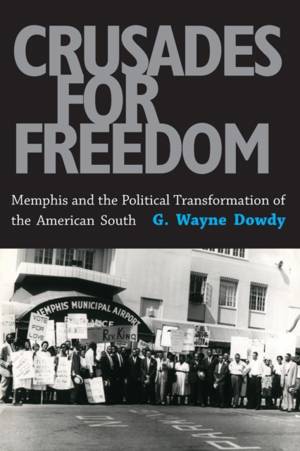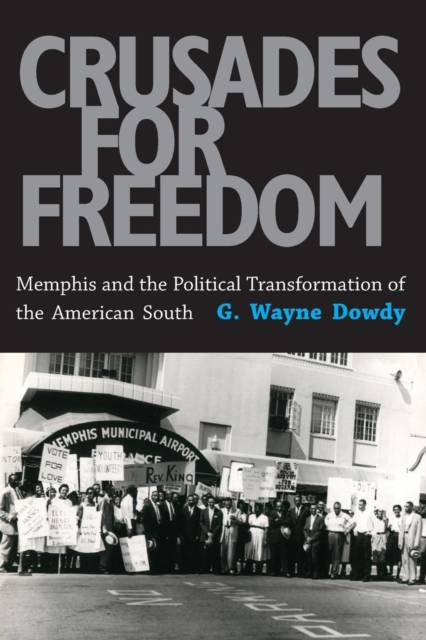
Bedankt voor het vertrouwen het afgelopen jaar! Om jou te bedanken bieden we GRATIS verzending (in België) aan op alles gedurende de hele maand januari.
- Afhalen na 1 uur in een winkel met voorraad
- In januari gratis thuislevering in België
- Ruim aanbod met 7 miljoen producten
Bedankt voor het vertrouwen het afgelopen jaar! Om jou te bedanken bieden we GRATIS verzending (in België) aan op alles gedurende de hele maand januari.
- Afhalen na 1 uur in een winkel met voorraad
- In januari gratis thuislevering in België
- Ruim aanbod met 7 miljoen producten
Zoeken
Crusades for Freedom
Memphis and the Political Transformation of the American South
G Wayne Dowdy
Paperback | Engels
€ 59,45
+ 118 punten
Uitvoering
Omschrijving
During the first half of the twentieth century, the city of Memphis was governed by the Shelby County Democratic Party controlled by Edward Hull Crump, described by Time magazine as "the most absolute political boss in the US." Crusades for Freedom chronicles the demise of the Crump political machine and the corresponding rise to power of the South's two minorities, African Americans and Republicans. Between the years 1948 and 1968, Memphis emerged as a battleground in the struggle to create a strong two-party South. For the first time in its history, both Republican and Democratic presidential candidates campaigned vigorously for the Bluff City's votes. Closely tied to these changing political fortunes was the struggle of African Americans to overturn two centuries of discrimination. At the same time, many believed that the city needed a more modern political structure to meet the challenges of the 1950s and 1960s, preferably a mayor-city council governmental structure. By 1968 the segregated social order had collapsed, Black politicians were firmly entrenched within the Democratic Party, southern whites had swelled the ranks of the GOP, and Memphis had adopted a new city charter.
Specificaties
Betrokkenen
- Auteur(s):
- Uitgeverij:
Inhoud
- Aantal bladzijden:
- 183
- Taal:
- Engels
Eigenschappen
- Productcode (EAN):
- 9781617037092
- Verschijningsdatum:
- 14/10/2013
- Uitvoering:
- Paperback
- Formaat:
- Trade paperback (VS)
- Afmetingen:
- 152 mm x 229 mm
- Gewicht:
- 299 g

Alleen bij Standaard Boekhandel
+ 118 punten op je klantenkaart van Standaard Boekhandel
Beoordelingen
We publiceren alleen reviews die voldoen aan de voorwaarden voor reviews. Bekijk onze voorwaarden voor reviews.









